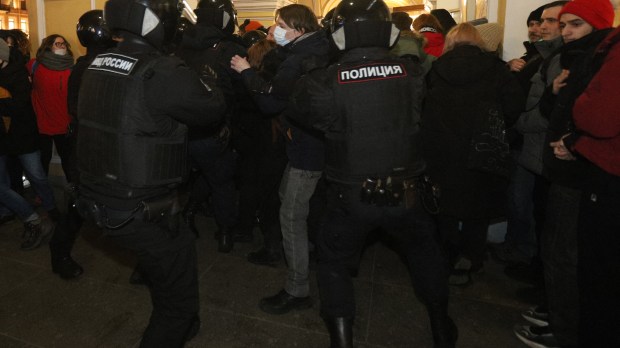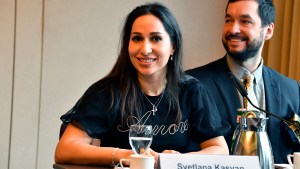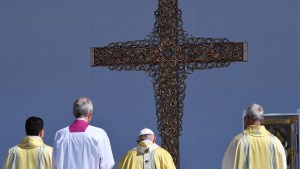A Catholic civil official in Moscow is due in court Friday morning on charges that he discredited the armed forces of Russia. His crime: quoting Pope Francis on his Facebook page.
Konstantin Jankauskas, a member of the Council of Deputies of the Zyuzino Municipal District of Moscow, is to appear in district court Friday. He said on Facebook that he doesn’t know what to say to the judge, as the pope’s statement, from his Angelus address March 13, is self-explanatory.
“This is Pope Francis’ prayer for peace and an end to war in Ukraine,” Jankauskas said. “Words so simple and understandable for any believer, and just for any human, that I just quoted them all. And there is nothing more to add to them. How can a prayer for peace and life discredit someone? This is some absurd and [a] real attempt to call white black.”
At the end of his Angelus address on Sunday, March 13, the pope made one of many appeals for peace in Ukraine. “Brothers and sisters, we have just prayed to the Virgin Mary,” he said. “This week, the city that bears her name, Mariupol, has become a city martyred by the heartbreaking war that is devastating Ukraine. Faced with the barbarity of the killing of children, and of innocent and defenseless citizens, there are no strategic reasons that hold up: the only thing to be done is to cease the unacceptable armed aggression before the city is reduced to a cemetery. With an aching heart I add my voice to that of the common people, who implore the end of the war.”
A weeks-long siege of Mariupol, on the Sea of Azov in Ukraine’s southeast, led to thousands of civilian deaths. Many people struggled to survive without heat, water and electricity and very little food or medicine. After the last Ukrainian soldiers finally lay down their arms after defending the heavily fortified Azovstal steel plant, Russia took control of the city.
In the meantime, Francis and other world leaders pleaded with Moscow to allow civilians to leave the besieged city or at least for humanitarian aid to be brought in. “In the name of God, let the cries of those who suffer be heard and let the bombings and attacks cease!” the pope said at the end of his remarks March 13. “Let there be a real and decisive focus on negotiation, and let the humanitarian corridors be effective and safe. In the name of God, I ask you: stop this massacre!”
Jankauskas’s quoting of the pope’s remarks on his Facebook page led to a fine and might lead to further legal troubles. Since Moscow’s February 24 invasion of Ukraine, which it has referred to as a “special military operation,” the Russian government has forbidden citizens to call it a war or invasion or criticize the armed forces. Early on, thousands of Russian anti-war protesters were arrested, and many opposition leaders have since left the country. On Wednesday, the former mayor of Yekaterinburg, Russia’s fourth-largest city, Yevgeny Roizman, was arrested on charges of discrediting the country’s military.
Jankauskas, 40, was born in Moscow into a family of Lithuanian origin. He earned a degree in political science from the Faculty of Philosophy at Lomonosov Moscow State University, studying the relationship between the state and civil society. He is a research fellow at the Institute for Market Problems of the Russian Academy of Sciences.
According to AsiaNews, Jankauskas helped to found the opposition 5th of December Party. He was first elected a deputy in the Zyuzino municipality in 2012 and re-elected in 2017. In 2014 he ran for the Moscow Duma, but was blocked by a criminal charge related to campaign financing of opposition leader Alexei Navalny. Jankauskas denounced the accusation as trumped-up and fabricated, but was placed under house arrest for a few days.
In 2019, he ran for parliament, but searches were carried out in relatives’ apartments, and he was arrested four times.
AsiaNews noted that Jankauskas’ father, Stasis Jankauskas, never hid his religious convictions, for which he was dismissed from his post as a university professor several times during his life under the Soviet Union.



